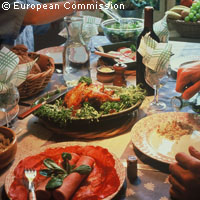Europe needs more holistic approach to food system, ESF claims
Scientists at a conference organised by the European Science Foundation (ESF) and the European Cooperation in the field of Scientific and Technical Research (COST) have called for a new, more holistic approach to the study of European eating habits. A better understanding of the European food system is required not only to prepare Europe for new food markets, but also to meet changes in its own market, they say. Food has become a global commodity: According to the ESF, the average European diet contains a broader range of meats and vegetables than 10 years ago. This also means that food travels longer distances before it ends up on European plates. This is happening increasingly due to, in part, migration into the EU bringing about a change in food taste, customs and traditions. In addition, an ageing population, obesity issues, increased wealth and longer workdays all have an impact on the food system just as much as changes to the Common Agricultural Policy (CAP) and World Trade Organisation (WTO) arrangements, climate and other environmental factors such as land degradation. 'This requires a new approach to describing food supply. We're advocating a food systems approach,' says Thomas Henrichs, a senior advisor for the National Environment Research Institute in Denmark. 'The food systems approach includes not only the activities involved in food supply, such as growing and processing a green bean and packaging it for distribution, and shipping it, but also the outcomes of eating the green bean on the environment, on the economy and on the health and welfare of the person eating it.' However, not only the European market is changing. Global markets are not what they used to be either: For instance, meat consumption in China is increasing, as is the consumption of dairy products in India, having implications on Europe as well. 'Until recently, Europe has invested intensively in its food system in relative isolation,' Rudy Rabbinge of Wageningen University in the Netherlands explains. 'But Europe must change its food system to take advantage of these new markets.' By studying food systems, scientists hope to improve their understanding of socioeconomic, political and cultural influences on European eating habits. They also wish to encourage the food industry and policy-makers to broaden their perspective and take into account the entire food system in order to increase overall efficiency.

